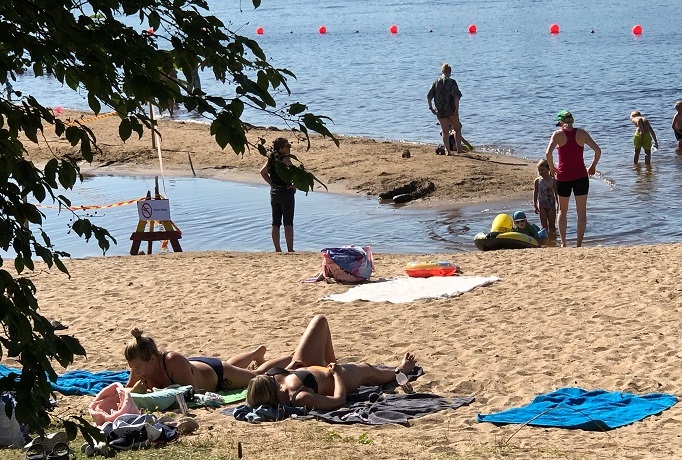THL warns of swimming at public beaches
Published : 05 Jul 2022, 00:04
Swimming is generally safe in Finland, but even water of good quality can become contaminated, said the Finnish Institute for Health and Welfare (THL) in a press release on Monday.
Epidemics caused by stomach bugs can spread at public beaches especially when there are large crowds at the beaches, as has been the case during the recent hot weather.
Water quality can be damaged by factors such as sewage leaks, urban runoff, blue-green algae, and human, or animal-borne faecal microbes and other harmful microbes in the water.
“When crowds gather at beaches in hot weather, the number of people exposed to possible contamination increases”, sid Outi Zacheus, Senior Planning Officer at THL.
If a municipal health protection authority suspects that the water at a beach poses a health hazard to swimmers, it can impose a ban on swimming or recommend that people avoid entering the water. In such situations, the beach should be avoided.
Water can cause gastrointestinal diseases if a swimmer accidentally swallows contaminated water.
A waterborne epidemic can spread at a beach also through unsanitary toilet facilities and poor hand hygiene if microbes that cause diseases reach the mouth through dirty hands.
Both swimmers and those maintaining beaches can take action to prevent epidemics from spreading at beaches.
People were urged to not to swallow water when swim, take care of own hygiene and use the toilet and washing facilities of the beach area and to change children nappies somewhere other than the water at the beach.
Blue-green algae and vibrios increase in hot weather and people are urged to avoid swimming in the Baltic Sea if their immunity is compromised
Microbes native to the water itself, such as blue-green algae and vibrios, can increase to a harmful degree in hot weather.
Hot weather can lead to an increase in vibrio bacteria in coastal waters this summer as well. Bacteria of the vibrio genus increase in warm salty coastal waters, but not in inland fresh waters.
“Infections caused by Vibrios can be dangerous especially for those with a lowered level of immunity. Such people should avoid swimming in the Baltic Sea during long heat waves especially if they have sores on their skin”, said THL Laboratory Coordinator Anna-Maria Hokajärvi.


